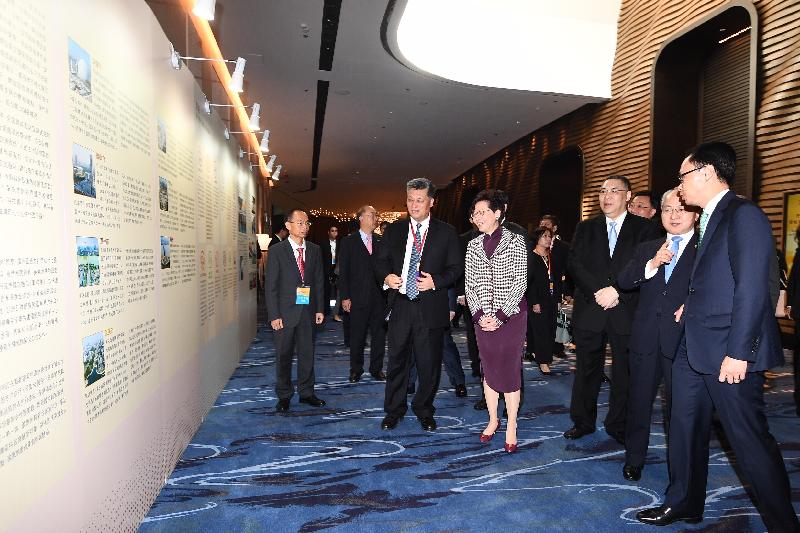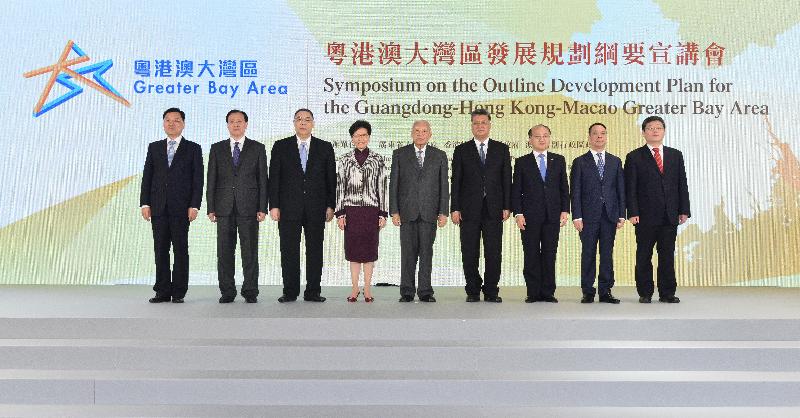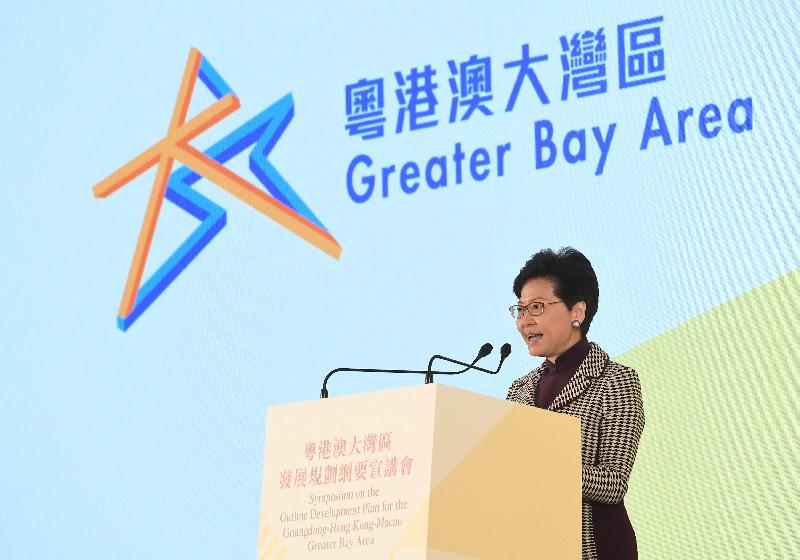CE's speech at Symposium on the Outline Development Plan for the Guangdong-Hong Kong-Macao Greater Bay Area (with photos/video)
******************************************************************************************
Vice-Chairman Tung Chee Hwa (Vice-Chairman of the National Committee of the Chinese People's Political Consultative Conference), Governor Ma Xingrui (Governor of Guangdong Province), Chief Executive Chui Sai-on (Chief Executive of the Macao Special Administrative Region), Director Wang Zhimin (Director of the Liaison Office of the Central People's Government in the Hong Kong Special Administrative Region (HKSAR) , Deputy Chairman Lin Nianxiu (Deputy Chairman of the Office of the Leading Group for the Development of the Guangdong-Hong Kong-Macao Greater Bay Area), Deputy Director Huang Liuquan (Deputy Director of the Hong Kong and Macao Affairs Office of the State Council), Commissioner Xie Feng (Commissioner of the Ministry of Foreign Affairs of the People's Republic of China in the HKSAR), distinguished guests,
Welcome to the symposium on the Outline Development Plan for the Guangdong-Hong Kong-Macao Greater Bay Area jointly organised by the governments of Guangdong, Hong Kong and Macao. I wish to extend my special gratitude to Deputy Chairman Lin Nianxiu of the Office of the Leading Group for the Development of the Guangdong-Hong Kong-Macao Greater Bay Area and Director General Guo Lanfeng of the Department of Regional Economy of the National Development and Reform Commission (NDRC). They have travelled all the way to Hong Kong from Beijing to introduce the contents of the Outline Development Plan to representatives from various sectors from Guangdong, Hong Kong and Macao. We are also honoured to have Governor Ma Xingrui of Guangdong Province and Chief Executive Chui Sai-on of the Macao Special Administrative Region visiting Hong Kong to set out the key work of Guangdong and Macao in implementing the Outline Development Plan.
Three days ago, the Central Government promulgated the Outline Development Plan for the Guangdong-Hong Kong-Macao Greater Bay Area. It is a national strategy personally devised, personally planned and personally driven by President Xi Jinping. It is not only a key development strategy in the country's reform and opening up in the new era, but also a further step in enriching the practice of "One Country, Two Systems". Through further deepening co-operation amongst Guangdong, Hong Kong and Macao, its objectives are to promote co-ordinated economic development in the Greater Bay Area, leverage the complementary advantages of the three places, develop an international first-class bay area for living, working and travelling, and further enhance the Greater Bay Area's supporting and leading role in the country's economic development and opening up.
On July 1, 2017, witnessed by President Xi Jinping, the NDRC and the governments of Guangdong, Hong Kong and Macao signed the Framework Agreement on Deepening Guangdong-Hong Kong-Macao Cooperation in the Development of the Greater Bay Area in Hong Kong. Since then, the Hong Kong SAR Government has kept in close contact with relevant central ministries and the governments of Guangdong and Macao to draw up and introduce policies and measures for the development of the Greater Bay Area. The Outline Development Plan is the best manifestation of the close co-operation amongst the three governments and their positive interaction with central ministries. In the process of drawing up the Outline Development Plan, the Hong Kong SAR Government put great efforts into reflecting the views our bureaux and departments obtained from consulting relevant sectors and stakeholders. On behalf of the Hong Kong SAR Government, I wish to thank the Central Government wholeheartedly for according much importance, and indeed accepting those views of Hong Kong.
On August 15 last year, the first plenary meeting of the leading group for the development of the Guangdong-Hong Kong-Macao Greater Bay Area, chaired by Vice Premier Han Zheng, took place in Beijing. Chief Executive Chui Sai-on and I attended the meeting as leading group members, demonstrating the key role played by Hong Kong and Macao in the Greater Bay Area. In his opening remarks, Vice Premier Han Zheng insightfully elucidated on three issues – why we develop the Greater Bay Area, what kind of Greater Bay Area is to be developed, and how we develop the Greater Bay Area. Today, I also wish to share my views on why Hong Kong needs to proactively participate in the development of the Greater Bay Area and how Hong Kong would do so.
Why Hong Kong should participate in the Development of the Greater Bay Area
For many years, Hong Kong has been one of the top performers in terms of global competitiveness, due to its excellent geographic location, its free and open market, as well as its advantages being an international city under "One Country, Two Systems". Nonetheless, as competition with nearby economies and globally intensifies, the strengths of Hong Kong's traditional industries are weakening. Today, amidst a slowdown in global economic growth and a rise of protectionism, Hong Kong faces increasingly serious challenges. As such, we must strive to innovate and develop high-value-added and diversified industries, in order to give new impetus to the economy of Hong Kong.
The Guangdong-Hong Kong-Macao Greater Bay Area is an enormous market with a population of 70 million and a gross domestic product of US$1.5 trillion. As one of the most open and economically vibrant regions in China, the Greater Bay Area is well placed to give new impetus to the development of Hong Kong, providing the people of Hong Kong, especially young people, with new horizons and new opportunities for developing their careers. Hong Kong must therefore grasp such invaluable opportunities and proactively take part in the development of the Greater Bay Area to create better conditions for ourselves.
How Hong Kong should participate in the Development of the Greater Bay Area
Under "One Country, Two Systems", Hong Kong enjoys unique dual advantages. On the one hand, Hong Kong is part of China; on the other hand, our economic, legal and social systems are different from those of the Mainland. Hong Kong is a highly open and international city, with a business environment that is open and facilitating, as well as professional services that are of excellent quality. Our strengths can complement the advantages of the nine Mainland cities within the Greater Bay Area, such as the size of their market, an all-rounded industry system, and their relative strength in technology. In fact, taking forward the co-ordinated development of the Greater Bay Area is conducive to further enhancing Hong Kong's status as international financial, transportation and trade centres, as well as an international aviation hub. In other words, Hong Kong's role in the development of the Greater Bay Area needs to change from being a "connector" to being a more proactive "participant". Meanwhile, the Government's new roles of "facilitator" and "promoter", as advocated by the current-term Government, will help Hong Kong take part in the development of the Greater Bay Area, allowing everyone in Hong Kong to become "beneficiaries" of the Greater Bay Area.
It is therefore evident that "One Country, Two Systems" is not only Hong Kong's advantage in the Guangdong-Hong Kong-Macao Greater Bay Area, but it is also the key foundation for the internationalisation of the Greater Bay Area. Central leaders have time and again emphasised that in the process of taking forward the development of the Greater Bay Area, the principle of "One Country, Two Systems", "people of Hong Kong governing Hong Kong" and the "people of Macao governing Macao" with a high degree of autonomy will be strictly adhered to. The development of the Greater Bay Area will enrich the practice of "One Country, Two Systems" and is conducive to maintaining the long-term prosperity and stability of Hong Kong and Macao. It will not, as some people worry, blur the boundaries between the "Two Systems", nor will it weaken Hong Kong's status as a separate customs territory. It certainly will not lead to the assimilation of Hong Kong into the Mainland either.
Future Work Focuses
To develop Hong Kong into an international metropolis with enhanced competitiveness, we shall follow the guiding directions in the Outline Development Plan, proactively co-operating with relevant central ministries, the People's Government of Guangdong Province and the Macao SAR Government in jointly taking forward work relating to the development of the Greater Bay Area. The Hong Kong SAR Government's future work focuses include: (i) consolidating and enhancing Hong Kong's status as international financial, transportation and trade centres as well as an international aviation hub; (ii) developing an international innovation and technology hub; (iii) expanding the scope of development for sectors in which Hong Kong's strengths lie, (iv) strengthening infrastructural connectivity, (v) fostering youth innovation and entrepreneurship; and (vi) fully utilising Hong Kong's international connections and networks to promote the Guangdong-Hong Kong-Macao Greater Bay Area overseas and attract capital and talents to the Greater Bay Area. I shall briefly elaborate on our work in the areas of finance, aviation, innovation and youth entrepreneurship.
Financial Services
Hong Kong's status as the world's premier international financial centre is well recognised. The city is ranked third in the Global Financial Centres Index and holds the top spot in Asia. Apart from our efficient links to other major commercial centres all over the world, Hong Kong has a financial regulatory and supervisory framework that is in line with international standards, as well as a strategic geographic location. Hong Kong can leverage on the development of the Greater Bay Area to promote the efficient flow of factors of production to support the development of the real economy. Meanwhile, we should make good use of the Greater Bay Area's enormous population and economic scale to promote the development of the financial services sector in Hong Kong. The Hong Kong SAR Government has maintained close liaison with the governments of Guangdong and Macao to seek support from the Central Government to implement concrete measures to promote financial co-operation within the Greater Bay Area and promote financial development in the region.
Aviation Development
Hong Kong is an international aviation hub. The Hong Kong International Airport connects to over 220 destinations. It handled over 74 million passengers and 5.1 million tonnes of cargo and air mail in 2018. Looking ahead to our future development, Hong Kong International Airport has an important strategic function for both the Guangdong-Hong Kong-Macao Greater Bay Area and the entire country. The three-runway system, which is under construction, will help strengthen connections between the country's and the world's flight destinations. The Hong Kong SAR Government will continue to support nearby airports in the Greater Bay Area to pursue development jointly based on complementarity and each airport's uniqueness. We shall also further expand the Greater Bay Area's domestic and international aviation networks, proactively take forward inter-modal services, expedite the development of general aviation, expand cross-boundary helicopter services, and leverage Hong Kong's unique role as a centre for manpower training of the aviation industry and for aviation financing and leasing in driving the development of the entire Greater Bay Area.
International Innovation and Technology Hub
The country has all along given staunch support to Hong Kong's innovation and technology development. In May 2018, President Xi Jinping gave a personal instruction, affirming that Hong Kong has a solid science and technology foundation and high-quality technology talents, and that Hong Kong's science and technology sector has made significant contributions to the development of Hong Kong and the country. The instruction also supports Hong Kong's development into an international innovation and technology hub. In line with the spirit of President Xi Jinping's personal directive, the Hong Kong SAR Government benefitted from concrete measures that had the Central Government's support and co-operation in the past year, including (i) realising cross-boundary remittance of science and technology funding of the Central Government to Hong Kong; (ii) signing a co-operation arrangement with the Ministry of Science and Technology fostering innovation and technology co-operation between the Mainland and Hong Kong; (iii) establishing that the Chinese Academy of Sciences (CAS) will set up an affiliated institution in Hong Kong to facilitate its research institutes to establish their presence in the two research clusters to be set up at the Hong Kong Science Park; and (iv) establishing a Greater Bay Area academician alliance in Hong Kong to promote exchange and co-operation amongst academicians of the CAS and the Chinese Academy of Engineering, bringing prominent scientists in the region to advise on technological development in Greater Bay Area.
In fact, after the planning and investment by the current-term Government in the last year or so, Hong Kong is ready to take on an important role in the work of developing the Greater Bay Area into an international innovation and technology hub. The Hong Kong SAR Government's concrete work on this front includes: (i) actively developing the Lok Ma Chau Loop into the Hong Kong-Shenzhen Innovation and Technology Park; (ii) developing a base for co-operation in scientific research through liaising with top-tier enterprises, R&D institutions and higher education institutions on the Mainland and overseas; (iii) actively pursuing the establishment of the two research clusters at the Hong Kong Science Park on healthcare technologies, as well as artificial intelligence and robotics technologies; (iv) nurturing local innovation and technology talents through measures such as the Postdoctoral Hub Programme and the Reindustrialisation and Technology Training Programme; (v) increasing scientific research funding for universities and providing tax deduction for the expenditures incurred by enterprises on research and development; (vi) introducing the Technology Talent Admission Scheme to enlarge Hong Kong's innovation and technology talent pool; (vii) establishing the Innovation and Technology Venture Fund to invest on a matching basis in local innovation and technology start-ups; and (viii) opening up Government data and introducing a pro-innovation Government procurement policy.
The measures above would strengthen Hong Kong's own innovation and technology capabilities. Together with the supporting policies in the Outline Development Plan, they will certainly speed up the process of developing an international innovation and technology hub in the Greater Bay Area.
Encouraging Youth Innovation and Entrepreneurship
The Hong Kong SAR Government encourages Hong Kong's young people to participate in the development of the Greater Bay Area and endeavours to provide more opportunities for the development of Hong Kong's young talents in innovation and entrepreneurship. Our objective is to foster the Greater Bay Area to become a world-class international platform for innovation and entrepreneurship. Through co-operation with subvented and non-governmental organisations, the Hong Kong SAR Government will provide young people starting their businesses in various Greater Bay Area cities with start-up grants, support, counselling, guidance, and incubation services. We shall also co-operate with the Guangdong Provincial Government to establish an Alliance of Hong Kong Youth Innovative and Entrepreneurial Bases in the Greater Bay Area with a view to providing a one-stop information, publicity and exchange platform, thereby supporting the development of Hong Kong youth entrepreneurs in the Greater Bay Area.
Conclusion
As President Xi Jinping mentioned in his speech at the meeting with the Hong Kong and Macao delegations from various sectors in celebration of the 40th anniversary of country's reform and opening up on November 12, 2018, the Greater Bay Area is to be developed under the conditions of one country, two systems, three customs territories and three currencies, without any precedents internationally. We should be bold in experimenting in order to break new ground. Hong Kong should improve its inner strength and resilience, as well as strive to create new drivers of economic growth. Facts speak louder than words: with the support of the Central Government, the governments of Guangdong, Hong Kong and Macao implemented in the past year or so many measures for the development of the Greater Bay Area. None of them breached the principle of "One Country, Two Systems". The Hong Kong SAR Government will continue to fully put the principle of "One Country, Two Systems" into practice, as well as proactively explore new development directions, expand fresh development space, and give renewed development impetus for Hong Kong through our participation in the development of the Guangdong-Hong Kong-Macao Greater Bay Area.
Speaking of functions of the Government, I noticed that Governor Ma Xingrui mentioned at the meeting of the People's Congress of the Guangdong Province on January 28 that the Guangdong Provincial Government will mobilise every force in the province to take forward the development of the Guangdong-Hong Kong-Macao Greater Bay Area. I also wish to state my position clearly: the Hong Kong SAR Government will spare no effort and do everything we can to take forward the development of the Greater Bay Area. Yet this colossal project also requires the participation of enterprises, professional sectors and ordinary people. The promulgation of the Outline Development Plan can help different sectors of society better understand the basic principles and broad policy directions of the development of the Greater Bay Area, such that they can consider how to expand their scope of development through opportunities brought about by the Greater Bay Area. To deepen understanding of the development of the Greater Bay Area in the wider society in Guangdong, Hong Kong and Macao, the Hong Kong SAR Government will launch different forms of publicity and promotional activities to allow enterprises and the public, and young people in particular, to understand and grasp the opportunities brought to them by the development of the Greater Bay Area. We also attach greater importance to our overseas promotion efforts. Last June, I led a delegation to Paris, France to conduct promotional activities jointly with the governments of Guangdong and Macao, which were well received. Guangdong, Hong Kong and Macao are planning to go overseas together again this year to jointly promote the Greater Bay Area.
Your attendance here at the symposium amidst your busy schedules has given us much confidence. I encourage you all to visit the Hong Kong SAR's dedicated website (www.bayarea.gov.hk) and our WeChat official account to learn more about the opportunities brought about by the development of the Greater Bay Area. Let us all grasp the opportunities of the development of the Greater Bay Area for a better tomorrow.
Thank you.
Ends/Thursday, February 21, 2019
Issued at HKT 13:35
Issued at HKT 13:35
NNNN







